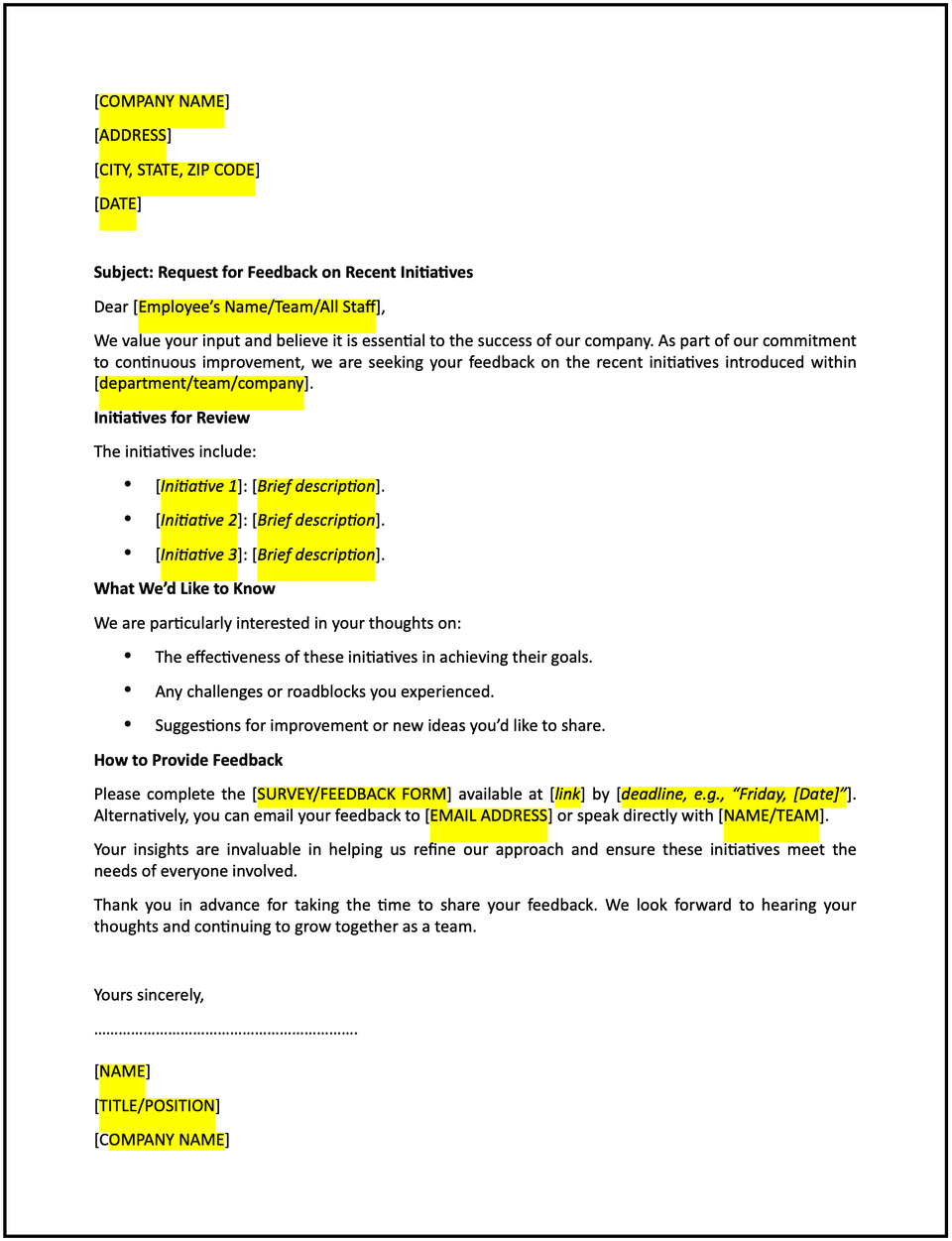Letter requesting feedback on recent internal initiatives: Free template

Letter requesting feedback on recent internal initiatives
A letter requesting feedback on recent internal initiatives is a formal communication used to gather input from employees about new projects, programs, or changes within the organization. This letter emphasizes the importance of employee feedback, outlines the initiatives in question, and provides clear instructions on how to share their thoughts.
How to use this letter requesting feedback on recent internal initiatives
- Open with an introduction: Address employees respectfully and explain the purpose of the letter—to request feedback on recent internal initiatives.
- Provide context: Briefly describe the initiatives, including their goals and why they were implemented.
- Highlight the importance of feedback: Emphasize how employee input will help assess the success of the initiatives and identify areas for improvement.
- Specify feedback details: Clearly outline the type of feedback you’re seeking, such as opinions, suggestions, or ratings, and any specific aspects to focus on.
- Include instructions: Provide clear guidance on how employees can submit their feedback, such as through surveys, meetings, or email.
- Reassure confidentiality: If applicable, mention that feedback will be anonymous to encourage open and honest responses.
- Maintain a professional tone: Ensure the letter is clear, respectful, and encourages participation.
- Provide contact information: Include details for employees to reach out with questions or additional input.
Benefits of using a letter requesting feedback on recent internal initiatives
This letter ensures a structured and professional way to gather employee insights while fostering transparency and engagement. Here’s how it helps:
- Promotes inclusivity: Encouraging feedback demonstrates that employee opinions are valued.
- Reflects professionalism: A well-crafted letter shows attentiveness to organizational growth and improvement.
- Encourages transparency: Clear communication fosters trust and collaboration.
- Supports improvement: Feedback helps refine internal initiatives and align them with employee and organizational goals.
- Strengthens relationships: A respectful approach reinforces the connection between employees and leadership.
Tips for writing an effective letter requesting feedback on recent internal initiatives
- Be specific: Clearly describe the initiatives and the type of feedback you’re seeking.
- Use professional language: Maintain a respectful and supportive tone to encourage open responses.
- Highlight the value of feedback: Emphasize how employee input contributes to organizational success.
- Provide actionable steps: Include clear instructions on how and where to submit feedback.
- Keep it concise: Focus on the key points while ensuring the tone is informative and inviting.
Frequently asked questions (FAQs)
Q: What details should I include in this letter?
A: Include a brief description of the initiatives, the type of feedback needed, submission methods, and deadlines.
Q: Should I personalize the letter?
A: Yes, addressing employees collectively or individually ensures clarity and demonstrates attentiveness.
Q: Who typically sends this letter?
A: Managers, team leads, or HR representatives usually send this letter.
Q: How formal should this letter be?
A: The tone should be professional yet approachable, focusing on clarity and encouragement.
Q: When should this letter be sent?
A: Send the letter shortly after the initiatives have been implemented to ensure feedback is timely and relevant.
Q: Can this letter include links to feedback tools?
A: Yes, providing links to surveys or forms makes it easier for employees to participate.
Q: Is acknowledgment from employees required?
A: While not mandatory, encouraging acknowledgment ensures employees are aware of the request and can plan to provide feedback.
This article contains general legal information and does not contain legal advice. Cobrief is not a law firm or a substitute for an attorney or law firm. The law is complex and changes often. For legal advice, please ask a lawyer.


